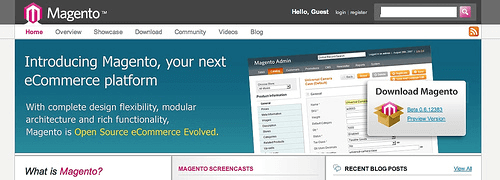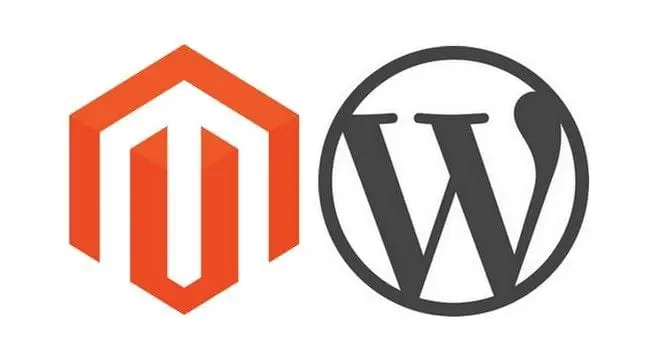Selecting the most suitable eCommerce platform for creating and running an online store is essential. There are a number of great platforms out there but Magento and Shopify are arguably two of the most popular. With both offering different features and benefits, we thought we’d provide a little comparison of Magento vs Shopify, so you can choose the right one for your business.
About Magento
Magento is one of the world’s leading eCommerce platforms, used by small, medium and large businesses all over the world. There are currently two versions of Magento; Magento Community and Magento Enterprise. Magento Community is an open source platform designed to offer businesses a flexible eCommerce solution. Magento Enterprise is a high-end eCommerce platform that is designed for use by large businesses and enterprise.
About Shopify
Unlike Magento Community, Shopify is a proprietary eCommerce solution and therefore requires users to set up a monthly payment plan. Shopify has been designed to make setting up an eCommerce store easy for users and currently claims to host around 50,000 online stores.
Usability
Shopify is a hosted solution, which means you won’t have to worry about buying separate hosting and installing the software. This is what makes it appealing to those who favour simplicity and are less tech-savvy.
Magento requires you to provide your own hosting. You will also have to install, setup and configure the software before you can actually start creating your eCommerce store. Although there are plenty of Magento installation tutorials online, you may find it beneficial to get an experienced Magento developer to do this for you.
Shopify is very user-friendly, so there isn’t much of a learning curve, especially when you compare it to Magento, which can be quite difficult to grasp. Having said this, if you have a web developer setting up, customising extending your store, you won’t need to worry, as the actual management of your inventory is very straightforward.
Features and functionality
The Shopify platform comes with all of the basic features a start-up or small eCommerce company would need to get their store up and running. These features include a content management system that can be used for inventory management (with HTML and CSS editing), coupon and discount creation and a number of payment options including PayPal and all the major credit cards.
Shopify has created its own app store, where merchants can purchase and install themes and apps to customise the look and functionality of their stores. The great thing about Shopify is that users can do everything themselves; there’s no need for them to pay a web design or web developer.
Magento may be more complex to set up, however this is because it has so many fantastic out of the box features for merchants to use. From SEO to multi-store management, Magento gives merchants full control over their eCommerce stores. They can also customise its appearance and functionality with a wide range of themes and modules, which can be downloaded from the Magento Connect store.
The thing about Magento is that there’s no limit to what you can do with it. As it is open source, you have the freedom to change and alter the core code in order to create a completely unique eCommerce store. Whilst you’re likely to need the help of a skilled Magento designer and developer, you will be able to build the eCommerce store you’ve always dreamed of owning.
Cost
As we previously mentioned, Magento Community Edition is completely free to download. Whilst this may sound very appealing, it’s important to remember that there will be some costs involved. For example, in addition to paying for your own Magento hosting, you are also likely to need to pay for Magento design and development services. If you plan on using the premium Magento themes and modules, you will need to factor their costs into your budget too.
Shopify currently has four monthly payment plans for you to choose from:
- Starter: $14 per month
- Basic $29 per month
- Professional $79 per month
- Unlimited $179 per month
Each plan also comes with an additional fee for those paying on credit card.
Shopify claims the professional plan is its most popular. For $79 you receive a Shopify POS, 5Gb file storage, unlimited products, 24x 7 helpdesk support, discount code engine, no transaction fees, fraud analysis/prevention tool, gift cards, reporting tools and abandoned cart functionality. You can also benefit from a 14 day free trial of Shopify prior to choosing your plan.
Whilst costs shouldn’t be your only consideration when choosing an eCommerce platform, it is likely to be one of your main concerns. When consulting with our clients and helping them choose the right stores, we ask them to consider both their current and future costs.
Choosing Shopify may currently seem cheaper for your business, as you’ll be able to pay your monthly fee and not have to worry about hosting and development costs but what about when your business has grown in a few years time? Will Shopify still meet your needs then? If the answer is no, then you’re going to end up paying migration costs in order to move your store over to Magento. Some would argue that it would be more cost effective to start out with Magento in the first place. Just a little food for thought!
Which is better for your business?
When it comes to choosing an eCommerce platform, what is right for one business will be completely wrong for another business? This is why it’s important to base your decision on your business needs and budget alone.
If you’re looking for a simple and affordable eCommerce solution that will allow you to set up, customise and run your eCommerce store yourself, then Shopify will make a great choice. It has enough features to satisfy a small to medium sized business.
However, if you require a powerful and professional eCommerce solution with extensive out of the box features and high customisability, Magento is the obvious choice.
In addition to offering everything you need to run a highly functional eCommerce store, it can also facilitate the growth of your business. Say you go from selling fifty products to thousands in a few years; Magento will still offer everything you need. Even if you decide to open multi-stores in different languages, you’ll still be able to manage them from your single Magento admin panel. It’s an eCommerce solution that’s designed to stand the test of time.

A selection of our older posts, written by various members of the team between 2015 to 2021.











0 Comments